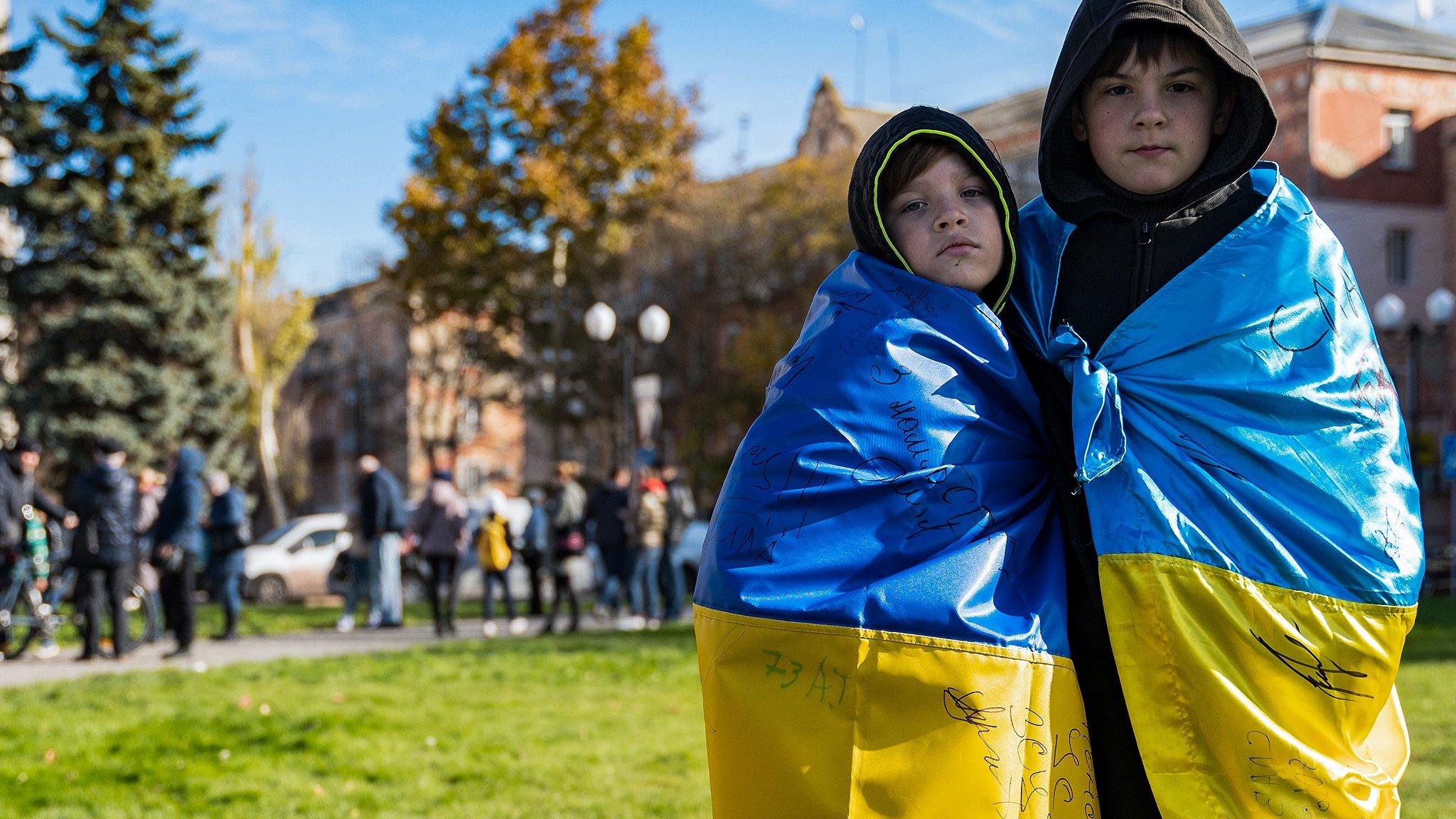Ukraine: What's the latest on the war with Russia?
- Published
- comments
WATCH: What's the latest on Russia's invasion of Ukraine?
It's been over a month since Russia invaded one of its neighbouring countries - Ukraine.
There has been conflict between the two countries since 2014 and despite Russia building up a lot of troops on the border, many people were still shocked when Russian President Vladimir Putin actually sent the Russian army to invade.
The Ukrainian army has been fighting against the Russian army while the world has been urging Mr Putin to stop his attacks. Millions of people have had to leave their homes to look for safety.
Recently, Russia has withdrawn some of its troops from the capital city, Kyiv, with some saying that there is a chance of peace talks between the two sides.
Here is everything you need to know about the current situation in Ukraine.
What is the latest?
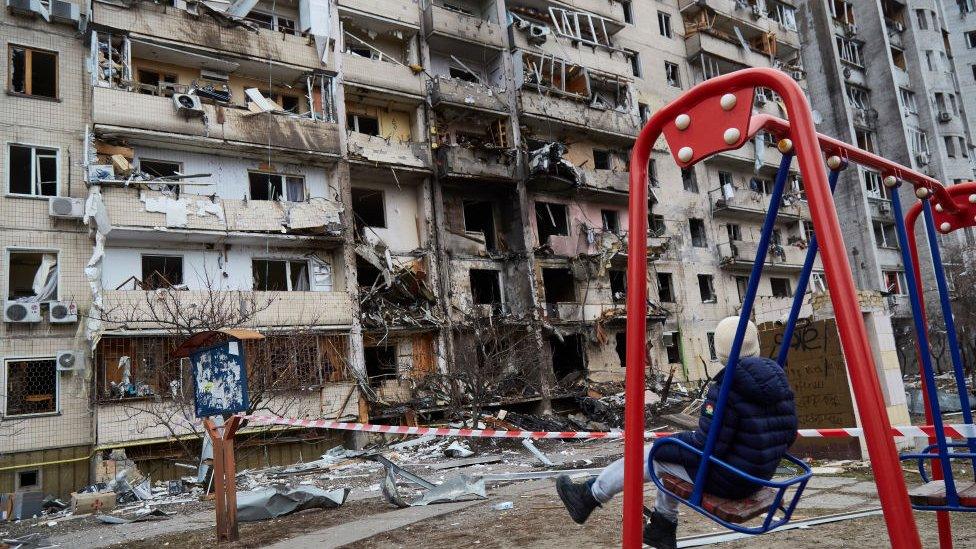
When Vladimir Putin ordered the invasion of Ukraine on 24 February, many thought his plan would be to use Russia's large army to overthrow Ukraine's government.
However, over a month on, Russia has not made as much progress as was first predicted. Military experts think that their plans have been scaled back.
The Russian invasion has been met with lots of resistance from Ukrainians who have been fiercely defending their country. Many Russian soldiers have lost their lives in the conflict so far.
The Ukrainian army has also been receiving lots of support in terms of weapons and kit from other countries to help them in their effort against the Russian army.
It has meant that Russia has been unable to take control of lots of Ukraine's major cities, including the capital, Kyiv.
Peace talks looking more likely
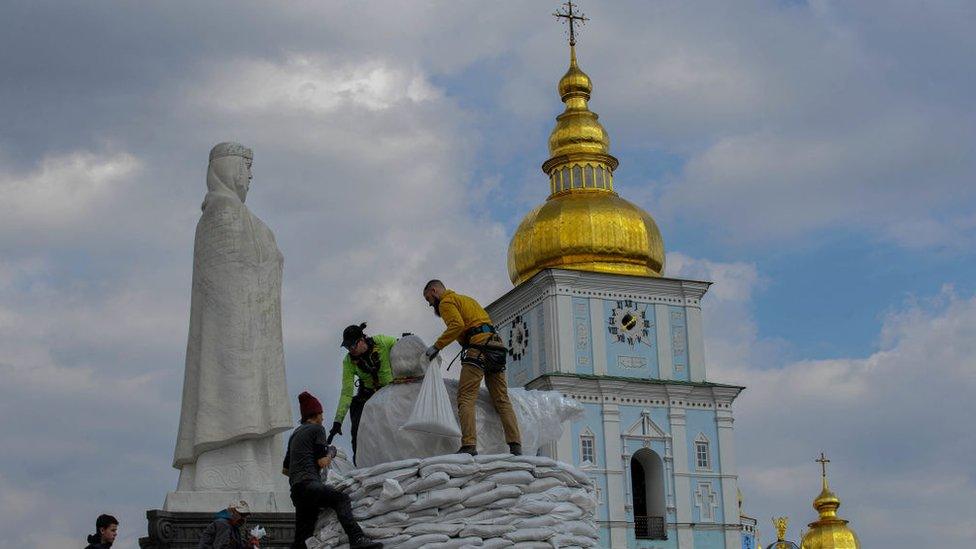
Volunteers use sandbags to protect monuments in Kyiv
On Tuesday, one of Russia's defence ministers said that they have decided to reduce the amount of "military activity" in Kyiv and another city called Chernihiv.
Russia hopes that by limiting military activity in Ukraine they can gain some trust from Ukrainians ahead of peace talks.
But while some are hopeful that this is a step in the right direction, Ukrainian's President Volodymyr Zelensky said that his people were not "naive" - meaning they won't fall for any tricks from the Russian army.
US President Joe Biden says "let's see" what happens on the ground, while the UK says Russia will be judged by actions not words.
And the UK Defence Ministry said there was a chance that the troops that are moved from Kyiv and Chernihiv could be sent to fight in eastern Ukraine, close to the border with Russia, instead.
Surrounded and cut off
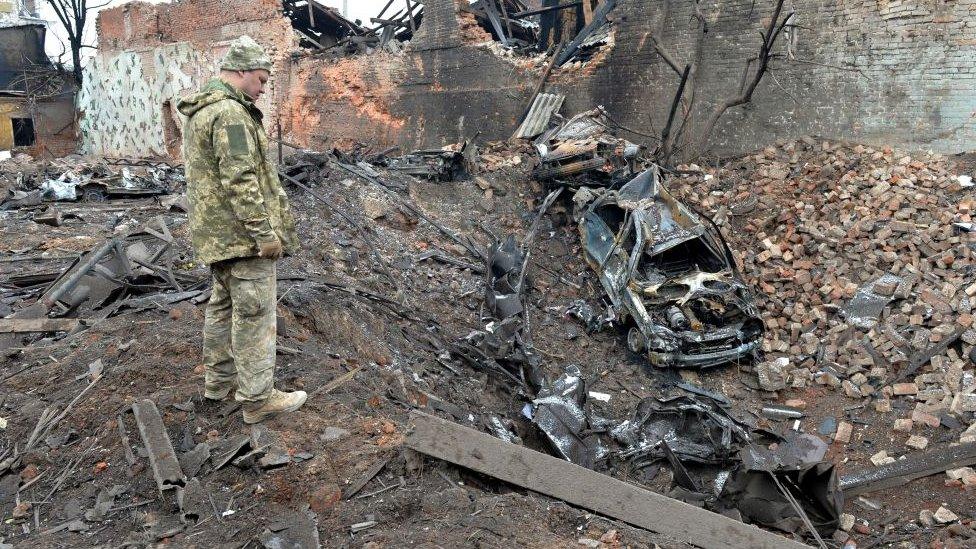
Instead of sending soldiers into every city, Russia has - in many cases - been trying to surround them and cut them off from important supplies.
It has also been firing missiles at cities where lots of people still live and it's made life incredibly difficult for them.
The southern city of Mariupol has become the most heavily bombed and damaged city in the war.
There have been reports that there are over 170,000 civilians trapped in the city without access to food and clean water.
WATCH: James Waterhouse answers your questions about Ukraine
Ukraine has also accused Russia of forcing thousands of civilians from Mariupol to move to Russian-held areas. Russia says it is helping people moved to safer parts of the country but denies they are being forced to leave.
In Chernihiv thousands of people living there have been trapped by Russian forces and have no running water, electricity and heating. Many building, homes and schools have been destroyed.
What will Russia do next?
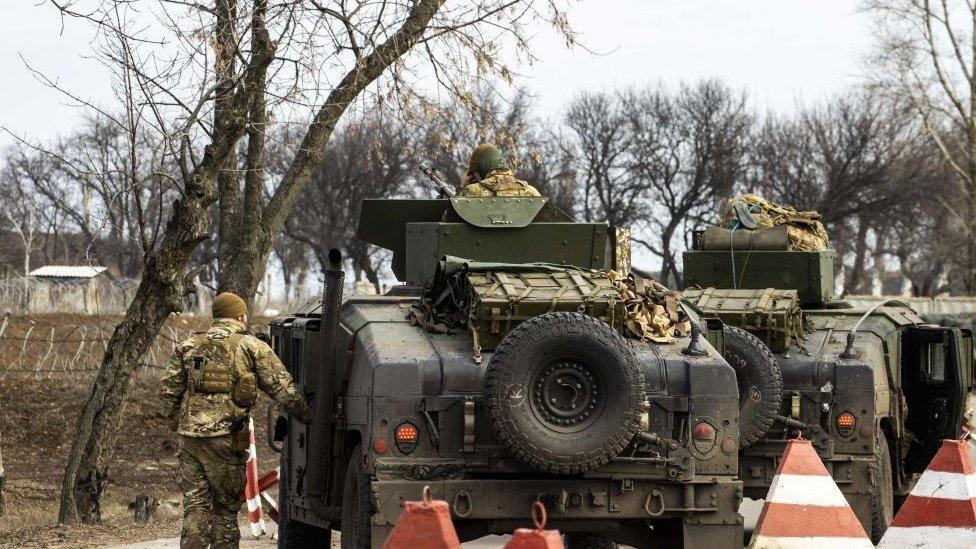
Russia now says it's focussing its attention on the east of the country, in two areas called Luhansk and Donetsk.
Some of the troops it plans to pull out of Kyiv and Chenihiv might now be sent to help fight in these areas.
These are two regions which have a very close relationship with Russia.
In 2014, Russia backed rebels took control of a third of the area and Putin now hopes to add the rest.
How many people have fled Ukraine?
WATCH: Nine-year-old Yarko tells Newsround about starting a new school and his new friend Vitali
More than ten million people have now been forced to leave their homes in Ukraine, according to the United Nations.
More than four million people have left for neighbouring countries, including Poland.
Poland has taken in the most refugees, with 2,293,833 crossing the border as of 27 March.
Another estimated 6.5 million people are thought to be homeless inside the war-torn country itself.
What is being done to help refugees?
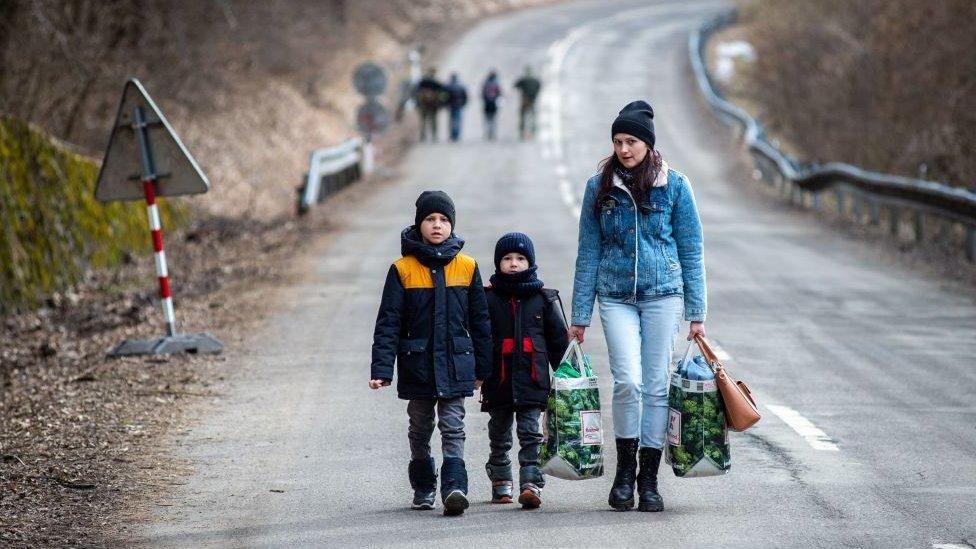
The UN, which is working with other organisations to provide help, says its offering assistance "wherever necessary and possible".
This includes giving cash to people for things like food and rent, delivering supplies and providing fold up beds to shelters.
The United Kingdom was criticised for the speed and scale of its response to the crisis but has since launched a family scheme for Ukrainians who have an immediate or extended family member in the UK.
As of 27 March, 21,600 UK visas - which allow people to come to the UK and stay for a set period of time - had been issued.
How have countries helped Ukraine?
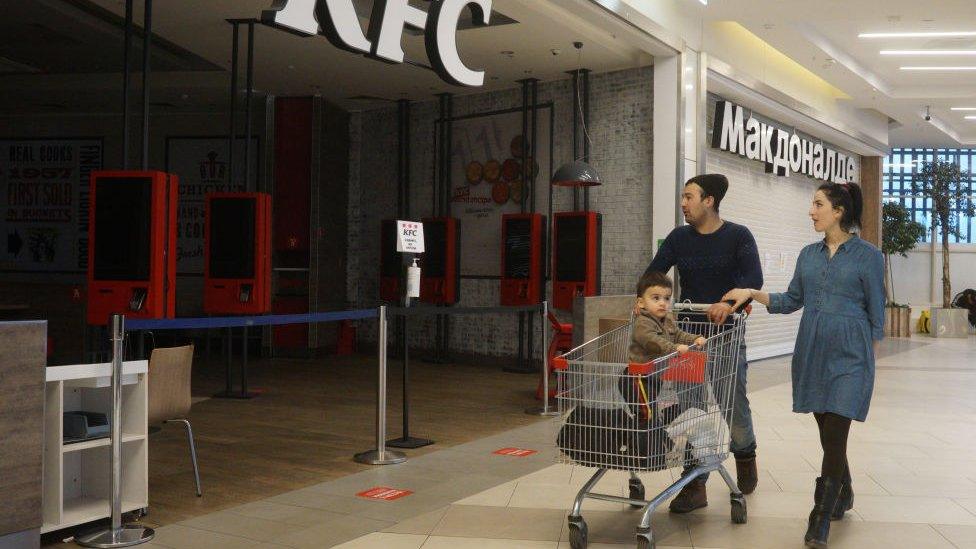
As well as military support - such as weapons and kit - one of the main ways countries have been trying to help Ukraine is by bringing in financial penalties against Russia.
These financial penalties are called sanctions and are imposed by one country on another, to stop it acting aggressively, or breaking international law.
Russian banks have been targeted and this has led to the value of Russian money to drop significantly.
All Russian flights have been banned from US, UK, EU and Canadian airspace.
Over 1,000 Russian individuals and businesses have been sanctioned by the US, UK and EU, including Chelsea owner, Roman Abramovich.
Chelsea FC sale halted by UK government
Lots of international companies including McDonald's, Coca-Cola and Starbucks have also stopped operating in Russia.
All of these factors have contributed to tougher living conditions for Russian households.
It's hoped these difficulties will force Mr Putin to withdraw Russian troops from Ukraine.
Will there be peace soon?
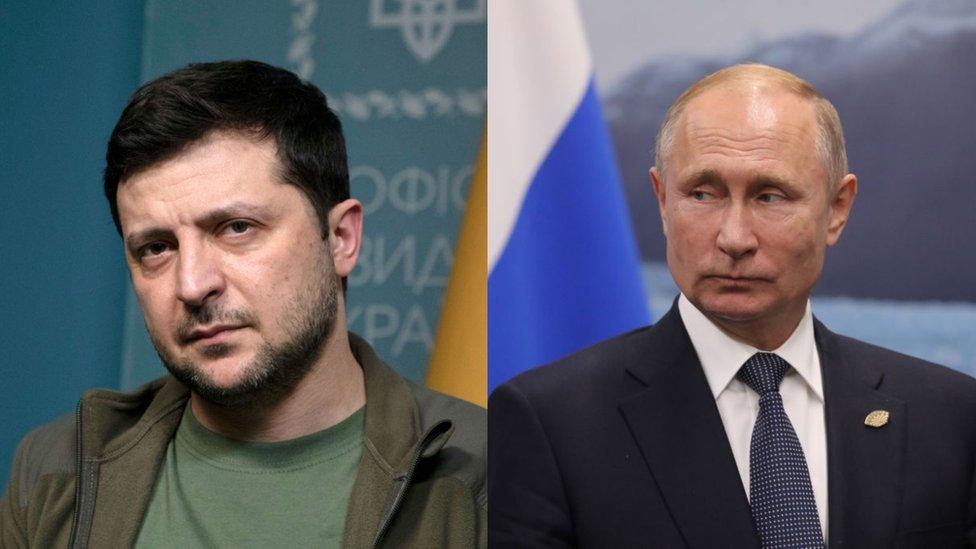
Representatives from Russia and Ukraine have been speaking in Istanbul in Turkey for the first face-to-face talks in more than two weeks.
Ukraine says its top priority from the talks is to work out a ceasefire which would end the war.
However, it's been reported that neither side is confident of making a breakthrough because they disagree on too many things.
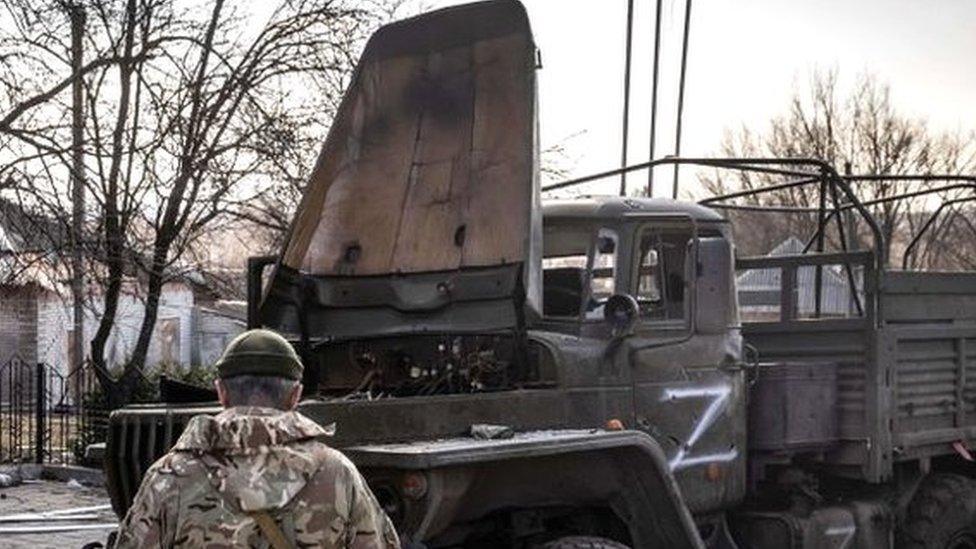
Russia says it is concerned about the closeness of Ukraine's relationship to western countries. Before the attack, Russia made demands including a promise that Ukraine would not join the North Atlantic Treaty Organisation (Nato) - a military alliance of countries which includes the US and the UK which promises to defend each other if they are attacked.
Ukraine has offered not to get too close to powers like the UK and the US and to remain neutral - which means not taking sides - but it also wants security guarantees that Russia won't be able to invade their country again.
This would require official legal promises of protection from countries such as the US, UK, Turkey, Germany and France - but at the moment that is thought to be unlikely.
However, some analysts have also said they are worried that Russia isn't really looking for peace at the talks but is just using them as a way to gain time when it can work out to do next with its army.
- Published18 March 2022
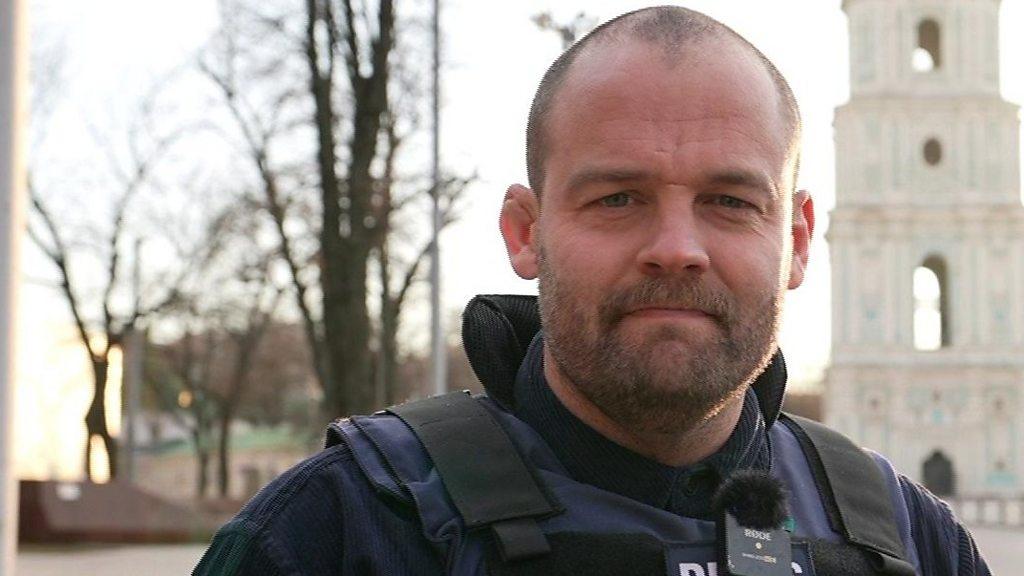
- Published29 August 2022
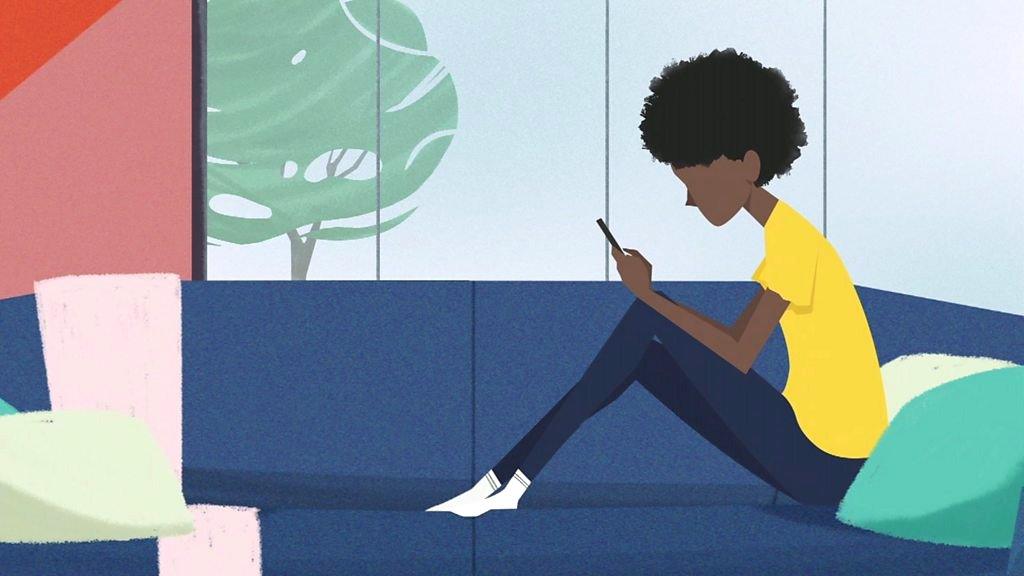
- Published22 February 2023
